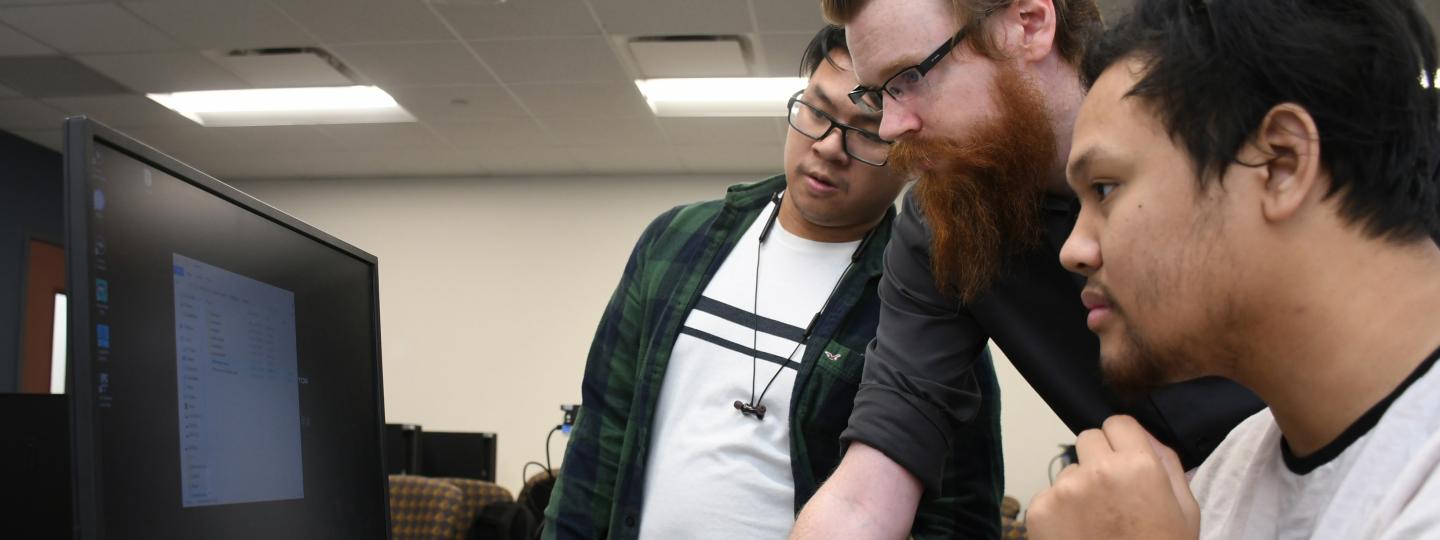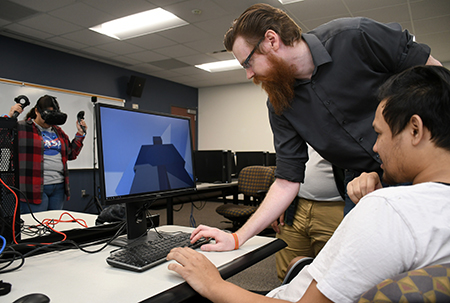Leveling up: Isaacks pays it forward with programming experience

James "J.D." Isaacks is proof life doesn't have to follow a certain trajectory.
In fact, the recent San Jacinto College alumnus took a reverse route: He worked in the computer programming industry before getting schooled in the industry. Isaacks already owned two application development companies before he stepped into the College's admissions office. While a San Jacinto College student, he began offering virtual internships to his peers through his company Rogue Dev Studios LLC. In 2018, he earned his associate degree in computer science.
Despite this non-traditional timeline, one thing is certain about Isaacks: his passion for sharing his industry experience. Now both a virtual internship provider and computer information technology adjunct faculty member at the South Campus, he introduces budding programmers and developers to higher-level concepts that make bachelor's degree courses seem like review.
"I strive to make a classroom environment that feels more like an indy development company than a college classroom," he said.
A willing recruit
While Isaacks studied at the College, Pamela Betts, computer science/CIT professor, saw his extensive experience in the gaming industry, technical tests, alphas, and betas. Betts' idea: What about creating virtual internships for other students through Rogue Dev Studios? Students could connect with industry in the classroom to accelerate their learning. For someone who gamed more for the technical thrill of breaking the programs and reporting bugs than for entertainment, Isaacks was up for the challenge.
"This internship is completed almost entirely in the classroom, and participation replaces project grades in the course," said Isaacks, who serves as both project manager and lead developer for students over a 16-week semester.
Now that Isaacks teaches at the College, the virtual internships run in other CIT instructors' classrooms.
Taking on actual clients, the interns have access to Rogue Dev Studios' resources and staff and follow the company's code standards and operating procedures. The experience builds teamwork, pacing, project management, and other soft skills.
Virtual internships
For one ongoing project, students helped create the Universal Authorized Report Generator, a tax reporting software framework, for the Washington Utilities and Transportation Commission.
Former virtual intern Gabriel Rosales contributed to the original team of about seven students. Now a software developer, he still refers back to the code problem solving and teamwork skills he gained in the internship.
"It's been a huge part of my career so far. The internship taught us a lot from an educational standpoint and a business standpoint," Rosales said. "I still use those practices now."
Picking up from another group, intern John Mai and his classmates worked on the backbone of the software. He described it as a fast-paced, learning-charged environment.
"It brought a whole breadth of information than I'd ever had before — brought industry and academics together," Mai said. "I was learning things that I would learn in later courses."
The interns have condensed thousands of Excel spreadsheets into a single automated report system for the Washington Utilities and Transportation Commission accounting team.
"We have taken associate-level students through several master-level concepts and created something unique in the computer science field: a brand-new data structure," Isaacks said.
Projects to show
With these achievements comes a huge time commitment: Isaacks can spend 60 hours a week assisting virtual interns beyond pursuing his bachelor's degree in electrical engineering and teaching Game and Simulation Programming I and Object-Oriented Design/Game Design at the College. He jokingly "blames" Betts not only for pitching the internship idea but also for roping him into teaching.
"While it started with the internships, we have been collaborating for the last two years to completely overhaul computer science courses," he said. "It has been a great partnership, combining my up-to-date industry experience with her 20-plus years of academic teaching."
Above all else, Isaacks encourages students to make the leap from acquiring classroom knowledge to tackling projects.
"Do something — almost anything — but do something," he said. "Our industry is about two things really: what you can show and how you interact. A person with soft skills and projects to show can get a good job with just an associate degree."
We have taken associate-level students through several master-level concepts and created something unique in the computer science field: a brand-new data structure.

